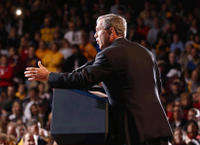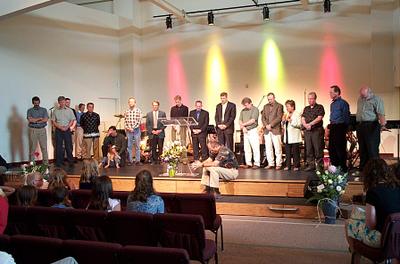Power and the Cross
Be Blessed, Jeff
Restoration in a World Full of Swords
 As mainstream publications begin weighing the pros and cons of teaching Intelligent Design, its important to remember one thing: any time the media or apologists for "the scientific community" tell us this is a debate between science and religion, they are lying.
As mainstream publications begin weighing the pros and cons of teaching Intelligent Design, its important to remember one thing: any time the media or apologists for "the scientific community" tell us this is a debate between science and religion, they are lying. "While global economies are converging, cultures are diverging, and the widening cultural differences are leading us into a period of conflict, inequality and segmentation." So writes David Brooks in his NY Times editorial this morning.
"While global economies are converging, cultures are diverging, and the widening cultural differences are leading us into a period of conflict, inequality and segmentation." So writes David Brooks in his NY Times editorial this morning. between Islam and Christianity. During the Fifth Crusade, Francis decided that the best way to gain the Holy Land (if that was important at all to him...doubt it) was to go and speak to the Muslim people and share with them the good news of Christ. Francis was imprisoned and (in serving the battle torn armies) infected with an eye disease he carried for the rest of his life. But Francis had many opportunities to talk with even the highest-ranking sultans about Jesus, displaying the reality of God through his own service and willingness to suffer for the good of others. (Here is a great talk on St. Francis by Brian McLaren--scroll down to talk '1883'.)
between Islam and Christianity. During the Fifth Crusade, Francis decided that the best way to gain the Holy Land (if that was important at all to him...doubt it) was to go and speak to the Muslim people and share with them the good news of Christ. Francis was imprisoned and (in serving the battle torn armies) infected with an eye disease he carried for the rest of his life. But Francis had many opportunities to talk with even the highest-ranking sultans about Jesus, displaying the reality of God through his own service and willingness to suffer for the good of others. (Here is a great talk on St. Francis by Brian McLaren--scroll down to talk '1883'.) I suggested last Sunday, and in a recent post, that Hell is not simply a future state, but that Jesus often uses the word to describe a condition we experience now. Some of Jesus' words make hell sound like a virus that is thriving inside us. Other times he says that by doing some small (seemingly harmless) things, we are walking on a slippery slope, and may soon be rushing toward fire. Fron these passages, Hell seems to be more than a place. It is better described as a spiritual condition in which our destructive tendencies, pride, and animal-wants overpower our souls, make us into something we are not meant to be, remove us further from the life of God. They do in fact remove some forever.
I suggested last Sunday, and in a recent post, that Hell is not simply a future state, but that Jesus often uses the word to describe a condition we experience now. Some of Jesus' words make hell sound like a virus that is thriving inside us. Other times he says that by doing some small (seemingly harmless) things, we are walking on a slippery slope, and may soon be rushing toward fire. Fron these passages, Hell seems to be more than a place. It is better described as a spiritual condition in which our destructive tendencies, pride, and animal-wants overpower our souls, make us into something we are not meant to be, remove us further from the life of God. They do in fact remove some forever.Link to Art Work by Cornelis Monsma
 Sunday, I referred to Mother Teresa and the manner in which she led her life as reflecting how things really are. That in living as she did, no arguments were advanced, but the revolutionary perspective of Jesus was presented: perhaps as powerfully as it could be.
Sunday, I referred to Mother Teresa and the manner in which she led her life as reflecting how things really are. That in living as she did, no arguments were advanced, but the revolutionary perspective of Jesus was presented: perhaps as powerfully as it could be.  I found this article encouraging. It documents a change in American social conditions which we should all be thankful for, such as a huge drop in domestic violence, alcohol related car fatalities, and violence by teens. The author proposes a set of four reasons for the shift:
I found this article encouraging. It documents a change in American social conditions which we should all be thankful for, such as a huge drop in domestic violence, alcohol related car fatalities, and violence by teens. The author proposes a set of four reasons for the shift: Here is an article from the Washington Post on the President's recent remarks that Intelligent Design should be taught along side the theory of Evolution. Set aside the debate, note the tone in this article.
Here is an article from the Washington Post on the President's recent remarks that Intelligent Design should be taught along side the theory of Evolution. Set aside the debate, note the tone in this article.  Recently, many thinkers I have listened to have been talking about Postmodernity--not as the world's predetermined course--but as just another step (and most-likely a very short one) in history's march. Reading this article, I was reminded that the deconstructionist perspective (if you can even designate it as such) has brought some needed critiques and perspective to the Church, but we should not give postmodernity more power than it actually possesses. We should remember, PM does not offer anything substantive. Its most important work is as a (necessary) critique of Modernity, and its excesses. The question is: once the criticizing is done, what fills in the void left by a dead modernity?
Recently, many thinkers I have listened to have been talking about Postmodernity--not as the world's predetermined course--but as just another step (and most-likely a very short one) in history's march. Reading this article, I was reminded that the deconstructionist perspective (if you can even designate it as such) has brought some needed critiques and perspective to the Church, but we should not give postmodernity more power than it actually possesses. We should remember, PM does not offer anything substantive. Its most important work is as a (necessary) critique of Modernity, and its excesses. The question is: once the criticizing is done, what fills in the void left by a dead modernity? 